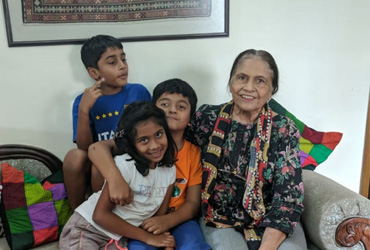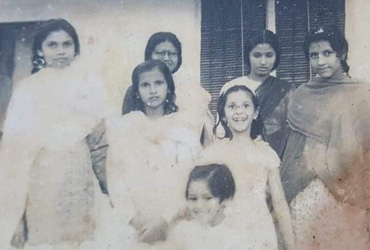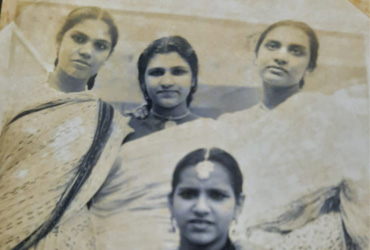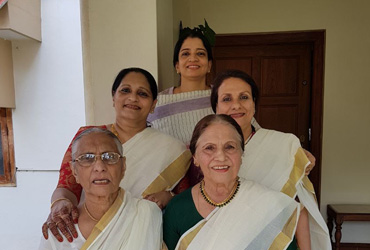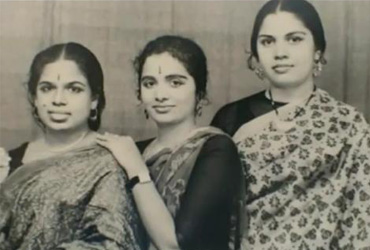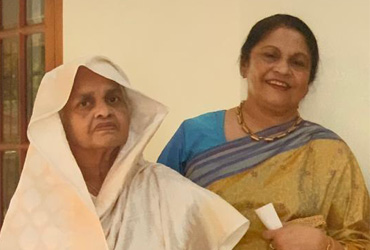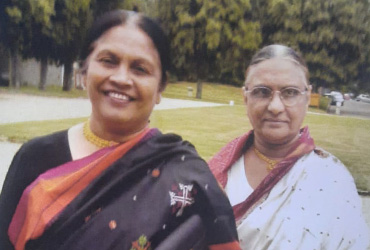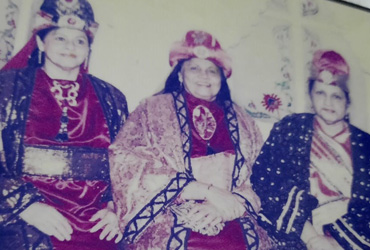
Saru: My aunt
My aunt Saru passed away on 25th March. She had been ailing for several weeks, but I did not expect that she would go away so soon. When the end came, it was sudden and peaceful. I was touched by the outpouring of grief from her several trainees and clients. She had a significant impact on the lives of so many people.
Saru was a true winner in the sense of Muriel James’s definition of a winner, as a person who makes goals and takes steps to achieve them. When she was in school, she played the role of Rani of Jhansi in a drama. She told me that this role had a deep impact on her, and motivated her to seek and occupy leadership positions. A turning point in her life was the end of her second marriage. She was deeply distressed by this unfortunate event. After the end of her first marriage, she married her second husband much against the wishes of her family. For a few years, she was the black sheep of the family. Saru was not a person who took things lying down. Through persistent efforts, she managed to get herself fully accepted in the family again. Not only that, she was also able to get her second husband fully accepted as a member of the family. I’ve always been amazed by this ability she had to ‘rise from the ashes’. The end of her second marriage was a major setback. For a while I wondered if she had lost her phoenix-like quality. In fact, the most productive and impactful part of her life was yet to come.
After a while, she pulled herself together and began to explore various productive avenues to follow for the rest of her life. Her first mission was to get justice from her former husband, for his unconscionable use of the ‘Triple Talak’ to end her marriage. She was fully engaged in this legal battle and was one of the first Muslim women to obtain reasonable and fair provision for future maintenance under The Muslim Women (Protectional Rights on Divorce) Act, 1986 from the Kerala High Court. This legal battle got her interested enough in legal issues to obtain a law degree.
Around this time, we were developing a TA training program as per the guidelines of the BOC of ITAA under the guidance of Father George Kandathil SJ, TSTA at ICTA in Kochin. I was going to Kochin to attend a meeting of people who were interested in this TA training. Saru was travelling with me. When we got to the venue of the meeting, I asked Saru to join me. This is how she started her TA training. The rest as they say, is history. After she became a TA therapist and trainer, she used to tell people that I was the one who introduced her to TA. Well, this is the extent of my introduction.
When I introduce myself to people at workshops, they often tell me, “Oh, so you are the one who brought Saru to TA”. I used to reply that all that I did was travel in the same car going to the first meeting. In those early days, we used to travel every month to Kochin for the weekend training groups. Saru was able to work through many of her personal issues during these training groups. Her analysis of the trajectory of her life and its possibilities for the future not only made her a winner but also developed in her deep insights in Scripts and Script analysis. I have heard from her trainees that Script analysis was one of her powerful therapeutic interventions.
Saru appeared for the CTA exams during the International TA Conference at Kochin in 1993. Sister Annie and I had appeared for the CTA exam in Stamford in 1991. Sister Annie passed, but I was deferred. All ICTA trainees appeared for the CTA exam at Kochin. Saru was very confident that she would pass. I was cautious and told her not to be overconfident. She said that she knew how to manage the examination board and that she would pass. And indeed, she did. As did all the other ICTA trainees. Saru was very confident of her ‘use of self’.
Subsequently. Saru started CHILD and ASHA. Her trust and counselling centre respectively, in Coimbatore. She had training groups in Coimbatore, Bangalore and Mumbai in India and in Bangladesh and Iran. She may be the most well-known face of TA in India.

